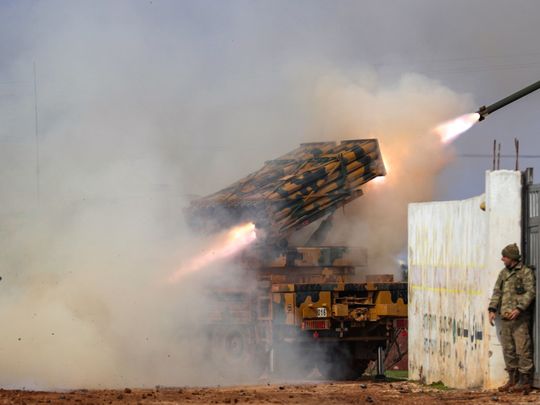
Nine years have passed since the demonstrations against the Syrian government degenerated into an armed conflict, which has so far claimed the lives of half a million people. Syria’s war has become a tragedy of our times, one that we have witnessed daily on our TV screens and in horrific videos on YouTube.
The conflict is now in its final phase, but it is no less brutal. Since the launch of a Syrian offensive on the last major rebel enclave, the northwestern city of Idlib, in December 2019, around 900,000 people have fled from their homes and shelters, according to the UN. That’s shocking since the conflict has already caused the biggest displacement of people since the Second World War.
Amid the refugee flight, an Arab role has been sorely missing in the efforts to bring peace to Syria, where non-Arab regional and international powers hold sway. Iran has used its intervention on behalf of President Bashar Al Assad to consolidate its armed presence. Turkey has backed the rebels and is engaged in a land-grab, on the pretext of fighting Kurdish militants.
Arab land has become a playground for foreigners, who are using it for their own nefarious pursuits and regional agendas. So an Arab role to confront the security challenges has become a necessity.
The UAE has made its stance clear from the beginning. It has taken a dim view of the lack of meaningful Arab involvement, and what is happening in Idlib is a testament to that. Arab land has become a playground for foreigners, who are using it for their own nefarious pursuits and regional agendas. So an Arab role to confront the security challenges has become a necessity.
While the human, sociological and psychological toll of the war has been beyond horrific, the economic fallout has also been devastating. The UN estimates the damages to be around $400 billion (Dh1.46 trillion). More than 80 per cent of Syrians live below the poverty line now, according to the UN, compared with 28 per cent before the war. Unemployment, power cuts and gas shortages are routine. Some 6.5 million people are unable to meet their basic needs.
The international community and various forces on the ground in Syria came together for eradicating Daesh. But many of them were drawn into power games that have prolonged the conflict and added more layers to it. This is just another consequence of the lack of involvement of Arab states.
The Arab League should immediately draw up a clear strategy and a realistic road map to end the conflict, which could help bring Syria back to the Arab fold.







